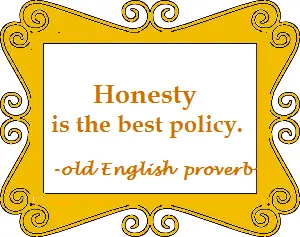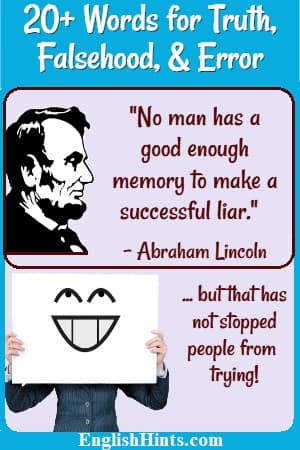20+ Words for Truth, Falsehood, & Error
How many words do you know for twisting the truth? There are many more than the English words for truth itself! Learn the differences in feeling, formality, or exact meaning between the various synonyms for honesty, lying, and inaccurate information.
At the bottom of the page there are some activities to practice and to rank different forms of these words for truth and untruths. See how many you can figure out!
Lies, Errors, & Deception
Lying (or “telling a lie”) is when a person says something he or she knows is false for the purpose of deceiving someone else (convincing them to believe something that isn’t true.)
Someone who tells lies is a liar. Most people have lied at some time, but lying can become a habit-- a way to try to impress others or to escape blame.
A “white lie” is a false statement to protect someone’s feelings: “That dress looks great on you. It doesn’t make you look fat at all.” “Thanks for the great present! I always wanted...” (when you didn’t really want it.) It’s usually possible to find a way to protect feelings without lying, but sometimes it’s a lot harder.
Someone can also say something false without knowing it’s false. (They are misinformed.) This is not lying but an error or mistake. They are wrong, but not trying to deceive someone.
Incorrect logic or arguments can lead to false conclusions and cause a lot of problems, even when the people who make them have good intentions. So can inaccuracy-- carelessness with details. (If a store adds your expenses inaccurately, their mistake can cost you as much as if they deliberately overcharged you or stole your money.)
People can also be deceitful without actually lying. They can misrepresent the facts or imply (without actually saying) that something is true when it’s not. This is called misleading (or fooling, tricking, or deceiving) people.
When the purpose of deception is to make money from someone, it’s fraud. Misleading claims and even fraudulent advertising are especially common when there are no simple, sure answers and people need answers. (Examples include cancer remedies or weight loss programs.)
When you need a product or service like that, a friend might quote an old Latin saying: “Caveat emptor,” which means “buyer, beware!” Watch out for people who might “stretch” the facts or misrepresent what they are selling to make it sound better than it really is.
The safest policy is to verify the facts for yourself: investigate what they say to find out if it is true or not. Some claims are unverifiable. That means there is no way to be sure if they are true or not.
In that case, think about your past experience with this person. Is he or she trustworthy? (Can you trust him completely?) Does his argument seem reasonable, or “too good to be true.”
If you have never seen anything like it before, or as good as he says, it is likely (probable) that he is exaggerating. To exaggerate is to make something sound bigger and better than it really is.
There is an old Russian proverb that U.S. President Reagan liked to quote, which says in English “trust, but verify.” It’s wise advice.
"Fake News"
Since this page was first written, the idea of "fake new" has become prominent. Fake news can of course be falsehoods-- invented or twisted stories presented as if they were news. The term is also sometimes used for news reports the speaker does not feel are fair.
NPR has a clear discussion on fake news and how to recognize it. You can get advanced English listening practice with the audio version. It's 27 minutes, but well-organized, with a good summary at the end. There's a shorter text version below it.
If you would like to read more, there is an interesting Smithsonian article about the long history of fake and falsified news, including the way several of the U.S. Founding Fathers felt about it-- and why most felt the first amendment was important, even when they were the ones being unfairly criticized.
If you are interested in journalism, politics, or American history, it's worth reading, or at least skimming. It's long, but the English is clear and simpler than many articles.
Practice These Words for Truth, Falsehood, & Error

It will be easiest to do these exercises on a piece of paper. You can just put the letters in order, and write the numbers for each entry in the tables (as well as filling in the blanks) if you don’t want the practice of copying every word.
You can also download this practice as a pdf to print out. It will be easier to see and fill out the practice tables on paper, especially if you are reading this from a mobile phone. Click here to download.
Put these words in order from the most honest or truthful to the most serious lie (There is no one right answer. Several of these words are about the same. Just think about what each means. However, the first and last are definite.):
· A. say something incorrect in error,
· B. lie,
· C. tell the truth but leave out important facts,
· D. deceive someone,
· E. tell the whole truth,
· F. perjure oneself (lie under oath)
· G. misrepresent a product,
Fill in the blanks in these tables with other forms of the words (see the examples in each table.)
Words for Truth & Honesty
| Nouns | Verbs | Adjectives | Adverbs |
|---|---|---|---|
| 1. ex: honesty | --- (to be honest) | honest | honestly |
| 2. | --- (to tell the truth or be truthful) | 2: true & truthful | 2: |
| 3. accuracy | |||
| 4. correction | to correct or to be correct | ||
| 5. | to validate | ||
| 6. 2nd ex: verification | to verify (find out the truth) | verifiable, unverifiable | --- |
Errors
| Nouns | Verbs | Adjectives | Adverbs |
|---|---|---|---|
| 7. ex: error | to err or to be in error | erroneous | erroneously |
| 8. | (to be mistaken or make a mistake) | ||
| 9. --- | (to be wrong) | ||
| 10. misinformation | --- | ||
| 11. | --- | inaccurate | |
| 12.--- | --- | incorrect |
Lies & Deception
| Nouns | Verbs | Adjectives | Adverbs |
|---|---|---|---|
| 13. ex: deception (or deceit) | to deceive | deceptive (or deceitful) | deceptively (or deceitfully) |
| 14. exaggeration | --- | ||
| 15. dishonesty | --- | ||
| 16. falsehood | to falsify (data) | ||
| 17.a lie, lying | to lie | --- | |
| 18. | to defraud | fraudulent | |
| 19. | to misrepresent | --- | |
| 20.--- | 2: misleading, misled | --- |
The introductory paragraphs show examples of how many of these words are used.
For related vocabulary, see Personality Vocabulary, Political Language, and Understand the News in English.
Home> How to Learn Professional Vocabulary> 20+ Words for Truth, Falsehood, and Error.
Didn't find what you
needed? Explain what you want in the search box below.
(For example, cognates, past tense practice, or 'get along with.') Click to see the related pages on EnglishHints.
| site search by freefind | advanced |






